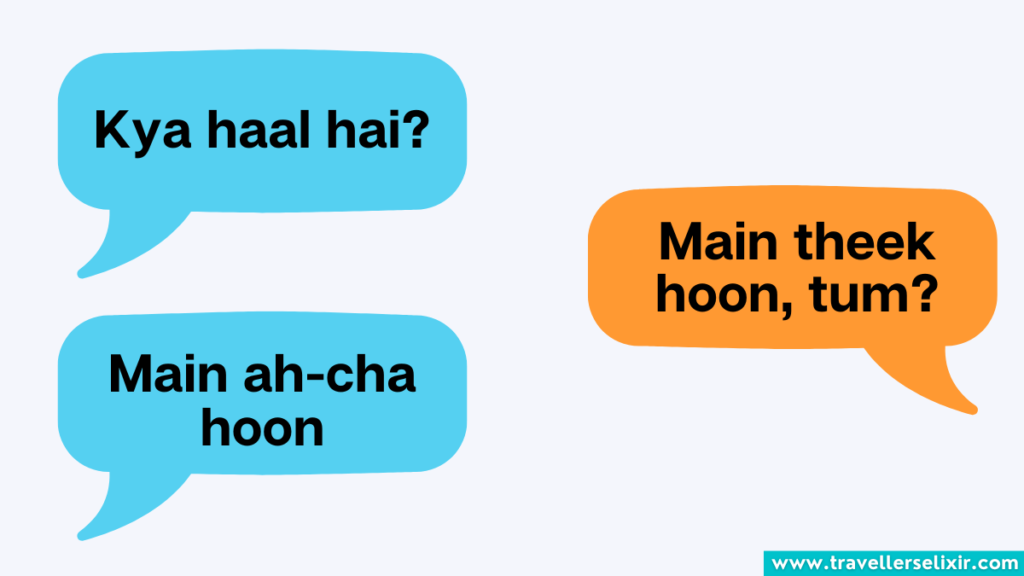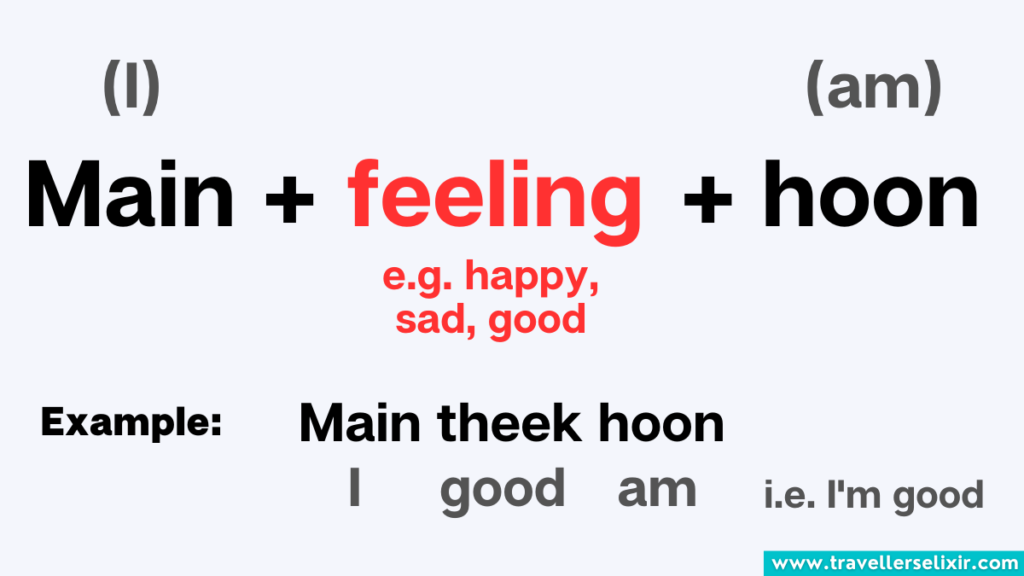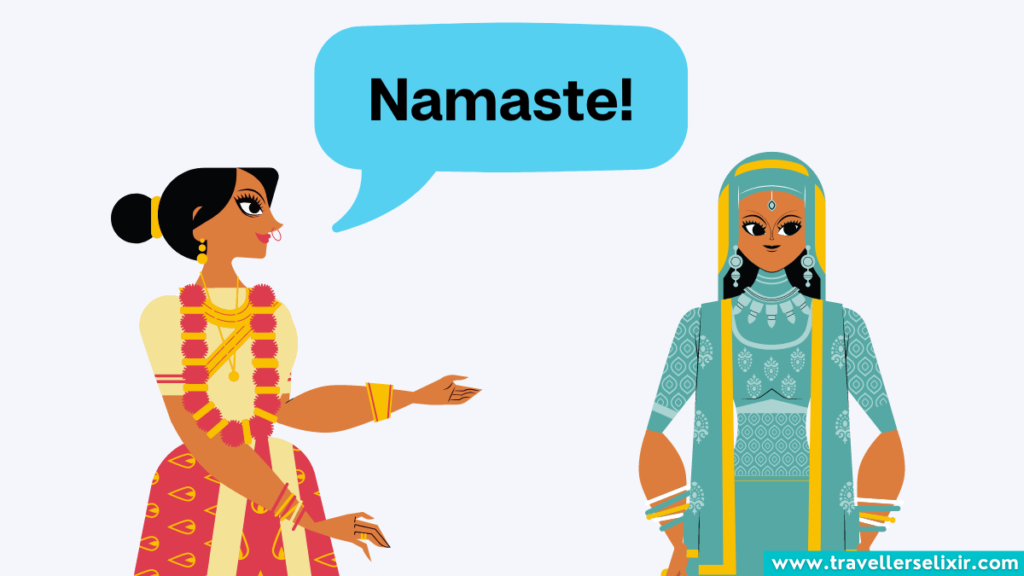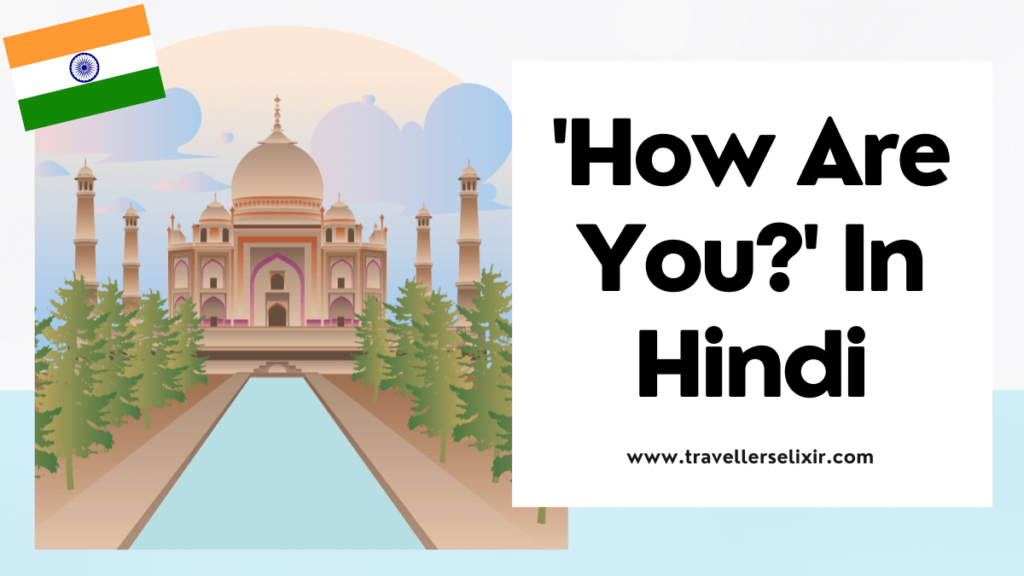When I first traveled to India a few years ago, I couldn’t speak a word of Hindi.
Even though most people could understand English, when I picked up a few common words and phrases in Hindi, it really made a huge difference!
I noticed that the locals were much more happy to chat with me and really appreciated the effort I’d put in.
In this post, I’ll tell you exactly how to say ‘how are you?’ in Hindi and I’ll cover the most common responses and some basic greetings.
Formal vs Informal
The first thing to know is that there are different ways to say ‘how are you’ in Hindi and the one you choose will depend on who you’re talking to.
We don’t really have this in English but it’s pretty common in many other languages including Spanish and French so you’ve probably come across it before.
Here’s an overview:
- You use the informal version when speaking with family and friends.
- You use the formal version when speaking with strangers or elders.
‘How Are You?’ In Hindi – Informal Version

Let’s start with the informal version of the phrase. You would use this one with family, friends or people that are younger than you like children.
Even within the informal version, there’s various different phrases in Hindi that all mean ‘how are you?’.
Here’s the most common ones:
- Kaise ho?
- Kya haal hai?
- Sab theek?
- Kya chal raha hai?
These all mean something along the lines of ‘how’s it going?’ or ‘what’s up?’. They’re all really informal ways of saying ‘how are you?’ in Hindi.
They’re all pretty common so you’ll hear these a lot in India. It’s also worth knowing that there’s plenty more ways to say it but these are by far the most common.
‘How Are You?’ In Hindi – Formal Version
If you’re visiting India for the first time as a traveler then you’ll likely be using the formal version of ‘how are you’ a lot.
This is the version of the phrase that you should use with people that you don’t know.
You should also use it with elder family members (like grandparents) to show respect.
This version of ‘how are you’ varies depending on if the person you’re talking to is male or female.
Here’s how to say ‘how are you’ formally in Hindi:
- Aap kaise hain? (to a male or a group)
- Aap kaisi hain? (to a female)
These are both really formal ways to ask someone how they are so you wouldn’t use it with a friend or family member.
The first phrase is used when speaking to a male or a mixed group. The second one is just for speaking to females.
Luckily there’s only a small difference between the two phrases so it’s not too difficult to remember. As you can see, the second word is pronounced slightly differently.
How To Respond To ‘How Are You?’ In Hindi
So now you’ve asked someone how they are in Hindi but that’s useless if you can’t understand their answer!
As you can imagine, there are so many different ways to reply to this question but I’ll try to summarize the most common ones for you.
Here’s the most common responses:
- I’m good – Main ah-cha hoon
- I’m fine/okay – Main theek hoon
- I’m very good/great – Main bahut ah-cha hoon
- I’m very happy – Main bahut khoosh hoon
- I’m sick – Main beemaar hoon
- I’m bad/not good – Main bura hoon
- I’m tired – Main thak gayaa hoon
- I’m sad – Main dukhee hoon
You might have noticed that all of the above responses follow the same sentence structure.
They all start with the word ‘main’ and end in the word ‘hoon’.
- Main = I
- Hoon = am

So basically ‘main + *feeling* + hoon’ means ‘I am *feeling*’. You just need to fill in the adjective with whatever you’re feeling. Easy, right!?
You might also have noticed that the word ‘bahut’ appears in several of the responses.
‘Bahut’ actually means ‘very’ so you can add it into any of the responses to emphasize how you’re feeling.
For example, if you want to say ‘I’m very sad’ or ‘I’m very happy’ then just add ‘bahut’ before the feeling adjective.
Here’s how to do that:
- I’m happy – Main khoosh hoon
- I’m very happy – Main bahut khoosh hoon
In this example, ‘khoosh’ means ‘happy’ and I added ‘bahut’ before it to emphasize that I’m feeling very happy.
How To Ask ‘And You?’ In Hindi
So maybe someone asked how you are in Hindi and you want to ask it back. It would be super useful to know how to say ‘and you?’ in Hindi.
Here’s how to say it:
- Aura aap? (formal)
- Aura tum? (informal)
Hopefully you remember when to use the formal version and when to use the informal version.
You can base it off of the phrase that you were asked e.g. if they used the formal version to ask how you are, you can respond using the formal version of ‘and you?’.
These phrases can also be shortened.
For example, you could just say ‘tum?’ rather than ‘aura tum?’ and you would be understood perfectly.
The words ‘aap’ and ‘tum’ actually both just mean ‘you’. ‘Aap’ is the formal word for ‘you’ and ‘tum’ is the informal word.
How Do You Say Hello In Hindi

Now that you’ve learned how to say ‘how are you?’ in Hindi, you might also wanna know how to say ‘hi’ or ‘hello’.
Here’s how to say hello in Hindi:
- Namaste
- Namaskar
- Pranam
‘Namaste’ and ‘namaskar’ are the most common ways to say hello in Hindi. You can use them in pretty much any setting.
‘Pranam’ is used only when greeting an elderly person.
Feel free to check out the below video for help pronouncing the phrases in this post:
And that’s it!
Thanks for reading this post on how to ask ‘how are you?’ in Hindi.
If you’re planning a trip to India then you might want to check out my India bucket list which includes all the things you should add to your itinerary.
Also make sure you read my India packing list to make sure you have everything you need for your trip.

